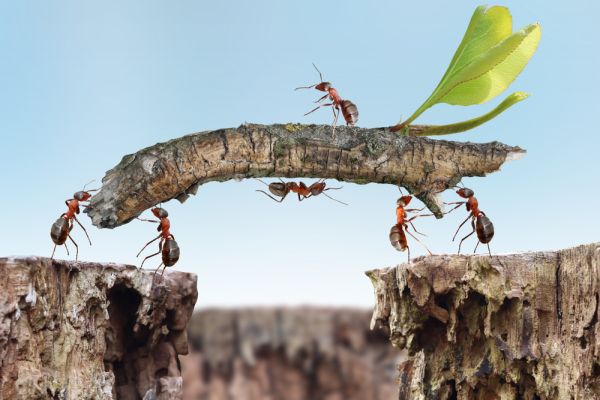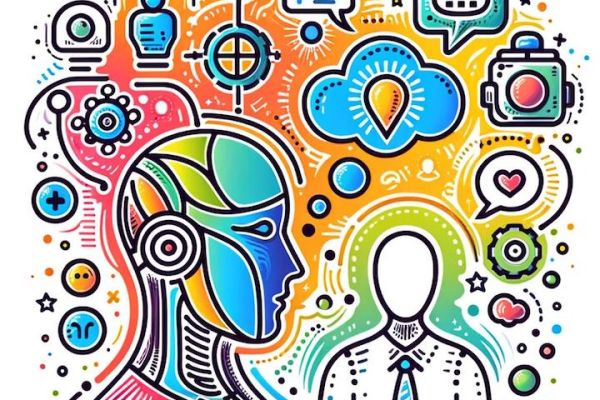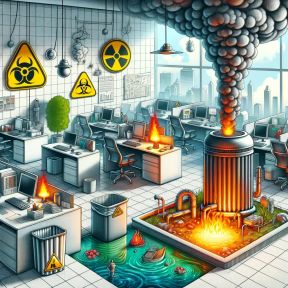
Teamwork
Teamwork—working with other people to achieve a shared goal—is essential in just about every domain, whether on the job, at home, or on the playing field. Though there are some situations where it’s better to act alone, learning how to work together without conflict is a critical skill that can help almost anyone achieve greater success.

Humans are social animals. Civilization itself is the result of the pooled effort of innumerable people over thousands of years. Examining human collaboration can help researchers, organizations, and families determine how to maximize teamwork going forward. Raising children or keeping a clean household, for example, requires cooperation and a fair division of the workload. The same applies in almost any workplace, where good teamwork is necessary for goals to be met and customers to be satisfied.
Cooperation is thought to be a key component of human nature. Working together allowed our early ancestors to survive; some experts posit that it even gave us an evolutionary advantage over other species of early humans who later died out. Cooperation allows humans to solve problems that individuals, acting alone, could not solve.
Effective teamwork increases efficiency because more people are sharing the load. It also boosts accountability and morale, and reduces the risk that a project will be derailed if one team member is absent or unable to contribute. It also allows team members to learn from each other and build new skills as projects progress.
There are instances where teamwork can backfire—particularly when a team falls victim to groupthink and makes a rushed, dangerous decision. What’s more, team members may not always benefit equally from a team’s success. Research has shown, for example, that male team members are more likely then women to see their careers advance after a team success.
Working together doesn’t always work. For some teams, it may be due to personality clashes—two people who both prefer to “take charge,” for instance, may struggle to collaborate. For other people, being on a team may actually promote laziness; since others are contributing, they may feel less pressure to do their share.
Good team players share several characteristics. They are willing to do their share of the workload, are reliable, are honest about problems or challenges, and communicate clearly. A positive attitude is also critical—no matter how good someone is at their job, they will only drag down the team if they are surly, pessimistic, or rude.

Teamwork comes naturally to humans as a whole, but that doesn’t always mean it’s easy for individuals to work with others. Some people, particularly those who prefer to work on their own, may feel out of place in a group or get frustrated by common teamwork pitfalls. To maximize teamwork, it's important that all teammates share the same goals and are committed to an overall vision. Often it takes just one person not pulling their weight—or defying the group's goals—to derail the efforts of everyone else on the team.
Yes; some individuals are more inclined to teamwork than others, but those who don’t naturally excel at it can become more adept. Teaching teamwork skills usually entails improving communication, building emotional intelligence, and imparting specific strategies for collaborating successfully.
Research has found that certain qualities are consistent predictors of a strong team. These include good communication—including ensuring that every member is given a chance to speak—and a trait known as “social sensitivity,” or members’ ability to understand each others’ thoughts and feelings and respectfully engage in disagreements.
Giving team members clearly defined roles, creating regular accountability checks, designating time for feedback, and leading by example are all strategies used by effective teams. Though team-building interventions are often derided, research shows that some—particularly those that improve trust and communication—can improve team effectiveness.
Trust is highly valuable in teams that have worked together for long periods; in such teams, higher levels of trust boost morale and trigger better performance. However, research suggests that when teams are forced to trust each other too quickly, or do so without evidence, it can have a negative effect on decision-making and outcomes.
To lead effectively, leaders should first work to instill a common vision and goal that is consistent with team members’ values. Next, they should clearly define members’ roles, set reasonable expectations, and be open to feedback and constructive criticism. In general, leaders should strive to cultivate diversity and to behave ethically, proactively, and professionally.
It likely depends on their specific challenges. If someone isn’t pulling their weight, for instance, engage them in a discussion of what they value in their work and what tasks they would find most meaningful. If someone dominates group discussions, ask everyone to share their opinion in turn so others are able to contribute.
Identify strengths and weaknesses and request tasks that are a good fit. Work on building flexibility, listening to everyone’s viewpoint (even contrary ones), and communicating honestly. Ultimately, learning how to be a team player is about managing emotions—whether frustration, fear, or embarrassment. Practicing emotional regulation will go a long way toward better teamwork.

Communication is essential to ensure that a team runs optimally. It can also, however, be one of the most challenging aspects of working with other people—and even when other aspects of a team are functioning smoothly, ineffective communication can derail an entire project. Some skills that improve communication, like emotional intelligence, come more naturally to some than others; fortunately, most people can learn to become better communicators with practice.
On an ideal team, every member would be encouraged to share their ideas and updates on progress—even if the news is bad—and other members would do their best to listen, evaluate without judgment, and offer a thoughtful response. On the other hand, poor communication—a boss shooting down, or shouting down, ideas from subordinates, or one employee consistently speaking over others—disrupts general cohesion and can throw an otherwise productive team off their game.
Team members should share relevant information when they know it, rather than waiting for an ideal moment. Each member should be encouraged to ask clarifying questions when necessary. Appointing one team member as the “devil’s advocate” can help the group consider potential problems and reach a better solution.
Nonverbal communication—including gestures, facial expressions, and tone of voice—can help or hinder a team’s productivity. An individual who rolls her eyes at others’ ideas, for instance, can be problematic for the team’s morale. Conversely, team members who excel at reading nonverbal cues can better navigate the group dynamic and help identify unspoken issues.
Yes. Emotional intelligence is a skill that enables people to better understand their own emotions as well as the emotions of those around them. Research suggests that teams with greater average emotional intelligence are more effective than less emotionally savvy teams. The skill can help teams navigate conflict, evenly divide work, and develop long-term trust.
Emotional contagion is a phenomenon in which emotions, positive or negative, “spread” from person to person. Thus, on a team, discontent and negativity originating in one member could soon "infect" others. Supporting the emotional needs of all members—as well as rooting out conflict and disagreement through open communication—is key to managing emotional contagion on teams.














